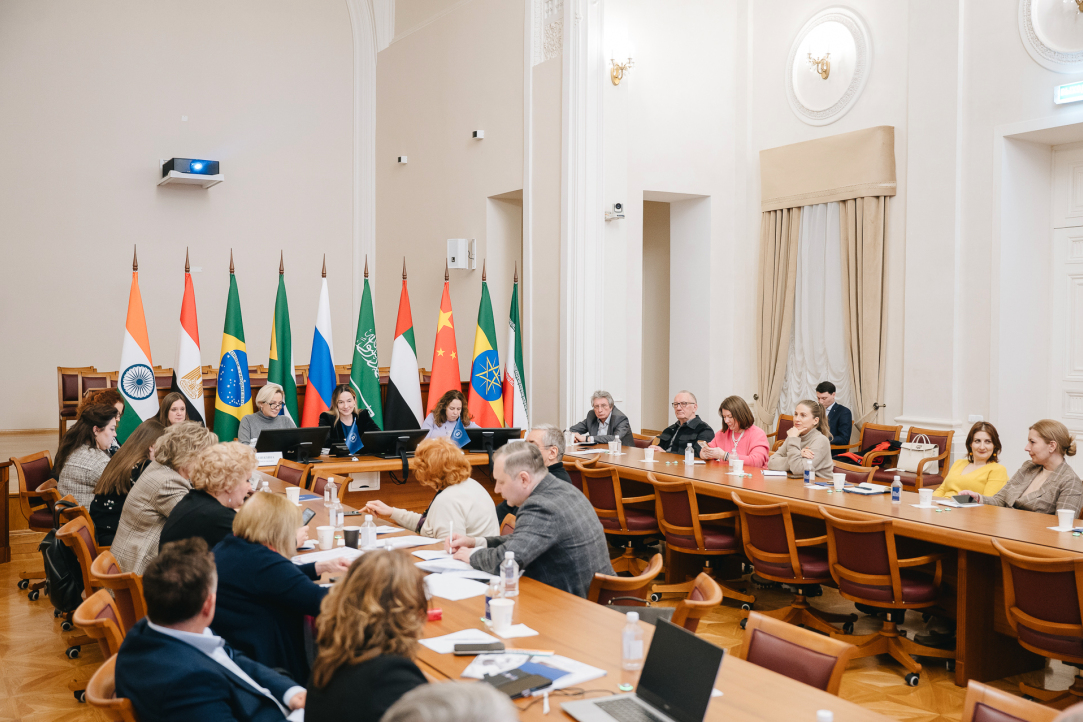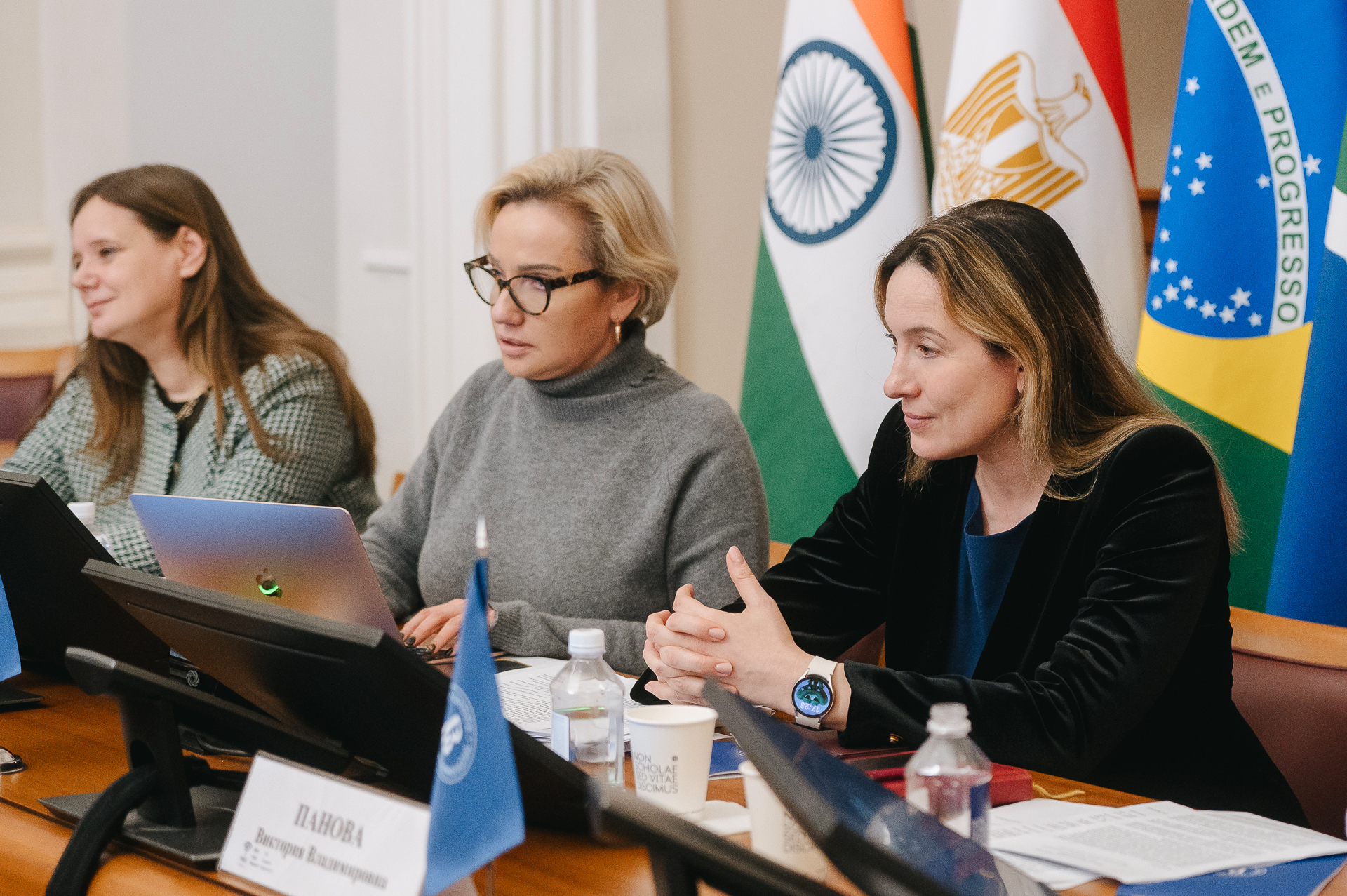HSE University Hosts the First Meeting of Russian NGO Representatives as Part of BRICS Civil Track

More than 50 representatives of non-profit organisations took part in the meeting, where they discussed the event plan for 2024 and thematic areas of activity of the working groups of the BRICS Civil Forum, scheduled to be held in Moscow in July 2024. The BRICS civil track’s operations are coordinated by the BRICS Expert Council–Russia.
Victoria Panova, Head of the BRICS Expert Council–Russia, Co-сhair of the BRICS Civil Forum, HSE University Vice Rector, delivered a welcoming speech at the meeting. She spoke about the priorities of the Russian BRICS presidency in 2024 in the framework of the civil track.

‘The theme of Russia’s BRICS presidency this year is "Strengthening Multilateralism for Equitable Global Development and Security." I am sure that the role of civil society organisations will only grow, and the new member countries will demonstrate their desire to actively join the agenda and will be able to develop a consolidated position on ensuring equitable and sustainable development. The main outcomes of the civil society’s efforts will be presented in July in Moscow during the BRICS Civil Forum,’ says Victoria Panova.
The BRICS Civil Forum is a discussion and presentation platform for civil society of the BRICS members and invited countries, which was launched in 2015 on the initiative of Russia. This year, it will be held on July 3–4 in Moscow. While preparing for the forum, the international civil society representatives will hold a series of meetings and round tables.
The meeting of representatives of Russian NGOs at HSE University is the first event of this series. During the meeting, the participants presented the activity plan of the BRICS civil track in 2024 and thematic areas of the forum's working groups. Co-chairs of the BRICS Civil Forum—Elena Peryshkina, Director of the AIDS Infoshare Foundation, and Elena Topoleva-Soldunova, Director of the Social Information Agency, member of the Civic Chamber of the Russian Federation—spoke at the meeting.
The BRICS Expert Council under the auspices of HSE University acts as the national coordinator of the expert and civil tracks on behalf of Russia, which is responsible for preparing and organising the BRICS Academic and Civil Forums.
The BRICS Expert Council–Russia was established at HSE University following an order by the Russian Government at the initiative of the Ministry of Foreign Affairs and the Ministry of Finance. The Council will perform expertise, analysis, and academic research on the most relevant issues of political, socio-economic and humanitarian cooperation among BRICS members.
See also:
HSE Strengthens Cooperation with India and Creates Opportunities for Dialogue between Experts
Following the visit of the HSE University delegation to New Delhi, cooperation agreements with leading Indian universities were finalised. Similarly, a number of expert events, consultations and negotiations on the development of comprehensive strategic cooperation with Bharat took place. The HSE University delegation also participated in the Raisina Dialogue, one of the largest international expert forums.
HSE Hosts Round Table ‘Africa and BRICS: Reflections and Prospects’
On April 15, 2024 HSE University hosted a roundtable discussion ‘Africa and BRICS: Reflections and Prospects.’ The event featured leading experts from the South African Institute of International Affairs (SAIIA) Steven Gruzd and Gustavo de Carvalho and was moderated by HSE Vice Rector and Head of the BRICS Expert Council–Russia Victoria Panova.
Intellectual Property Issues in the Framework of BRICS Discussed at HSE University
On April 8, a roundtable discussion entitled ‘Intellectual Property on the Rise: How to Maximize Its Positive Impact and Avoid Hazards’ took place at HSE University in Moscow. The participants included Victoria Panova, HSE Vice Rector and Head of the BRICS Expert Council–Russia, andAlan Freeman, Co-Director of Geopolitical Economy Research Group at the University of Manitoba; Secretary of Geopolitical Economy Research and Education Trust; Co-Editor of Geopolitical Economy Book series, Manchester University Press.
‘The Goal of the Contest Is to Select Bold Ideas Aimed at Fostering a More Equitable Global Development’
HSE Vice Rector, Head of the BRICS Expert Council–Russia and Co-chair of the BRICS Civil Forum Victoria Panova, and Dean of the HSE Faculty of Humanities and Chair of the Contest Jury Felix Azhimov, announced the primary objectives of the contest, its format and potential participants during a press conference at TASS. Nationals from the BRICS countries, aged 18 to 45, are eligible to apply for participation in the contest. The jury will select ten winners, three of whom will be given the opportunity to attend the BRICS Civil Forum in Moscow in person.
‘We Have Promising Opportunities with Africa, and It Is Important to Foster Cooperation’
A Strategic Session focusing on cooperation between Russia and African countries in the sphere of higher education was held at HSE University's building on Pokrovsky Bulvar. The event was attended by representatives of HSE University, rectors of other Russian universities, and ambassadors and ministers of higher education from several African states.
‘Fine-Tuning the Molecule’: Prospects for Biosimilar Market in BRICS Space
The market for biological products and their analogues is one of the most promising in the pharmaceutical industry. BRICS countries currently have great opportunities to develop this segment. The International BRICS Competition Law and Policy Centre at HSE University, together with the Institute of Chemical Technology, Mumbai, held a meeting of the BRICS Working Group for the Research of Competition Issues in Pharmaceutical Markets.
BRICS Antimonopoly Authorities to Join Forces in Regulating Grain Markets
More than 70% to 80% of the calories we consume are derived from grain products. However, the global grain market today is dominated by a small group of traders. The HSE International BRICS Competition Law and Policy Centre has proposed establishing an intergovernmental BRICS platform on fair competition to serve as a new mechanism for coordinating the efforts of antimonopoly authorities in regulating global markets. This topic was discussed at an international seminar in Cairo.
BRICS Expert Council–Russia Launched at HSE University
The official presentation of the BRICS Expert Council – Russia has taken place at HSE University. The Council will be responsible for the information, analytical and expert support of the Russian BRICS Chairship 2024.
Experts from HSE University Explore Prospects for Carbon Farming in Kazakhstan
HSE University’s International BRICS Competition Law and Policy Centre and the university’s Centre for Technology Transfer, together with the International Institute for Applied Systems Analysis (IIASA, Vienna), have released a draft version of the research report ‘The Carbon Farming Industry in Kazakhstan: Unlocking Opportunities.’ Experts from the UN Convention to Combat Desertification and the Kazakhstan-based TALAP Centre for Applied Research also took part in the project.
‘Seeing Moscow Ranked First among the Cities of BRICS Countries Is Pleasant, but Not Surprising’
An international consortium of research organisations from China, India, and Russia, including HSE University’s Faculty of Urban and Regional Development represented by experts from the Vysokovsky Graduate School of Urban Studies and Planning and the Centre for Social Research and Technological Innovation (CITY), is developing an index of technological and spatial urban development (the Urban & Innovation Environment Index). Recently, a list of the top 10 largest cities of the BRICS countries was published on the project’s website. The Russian capital took the first place in the ranking, followed by Beijing, Shanghai, Sao Paulo, and Guangzhou.


